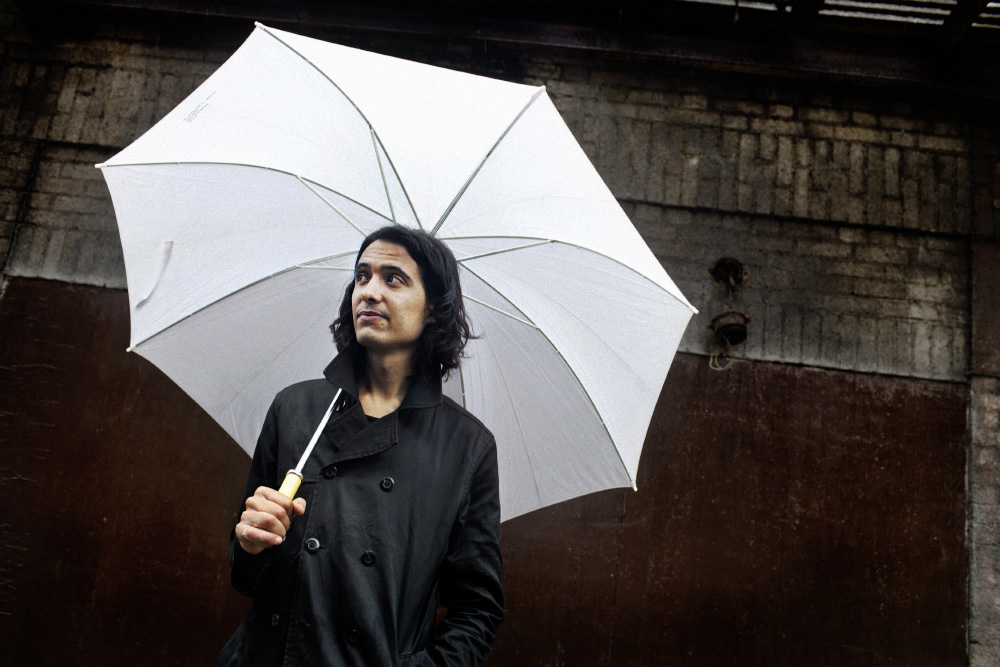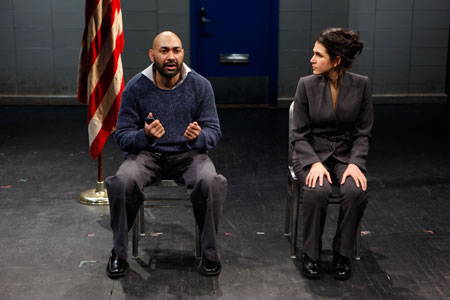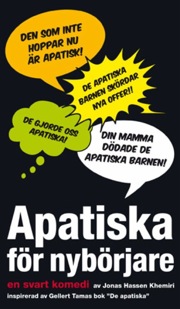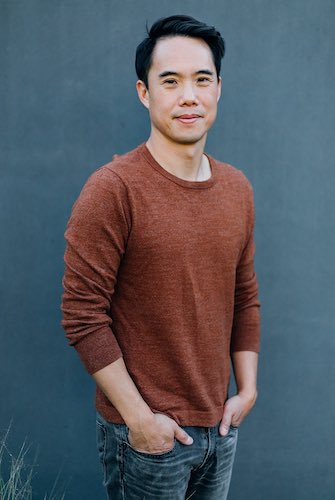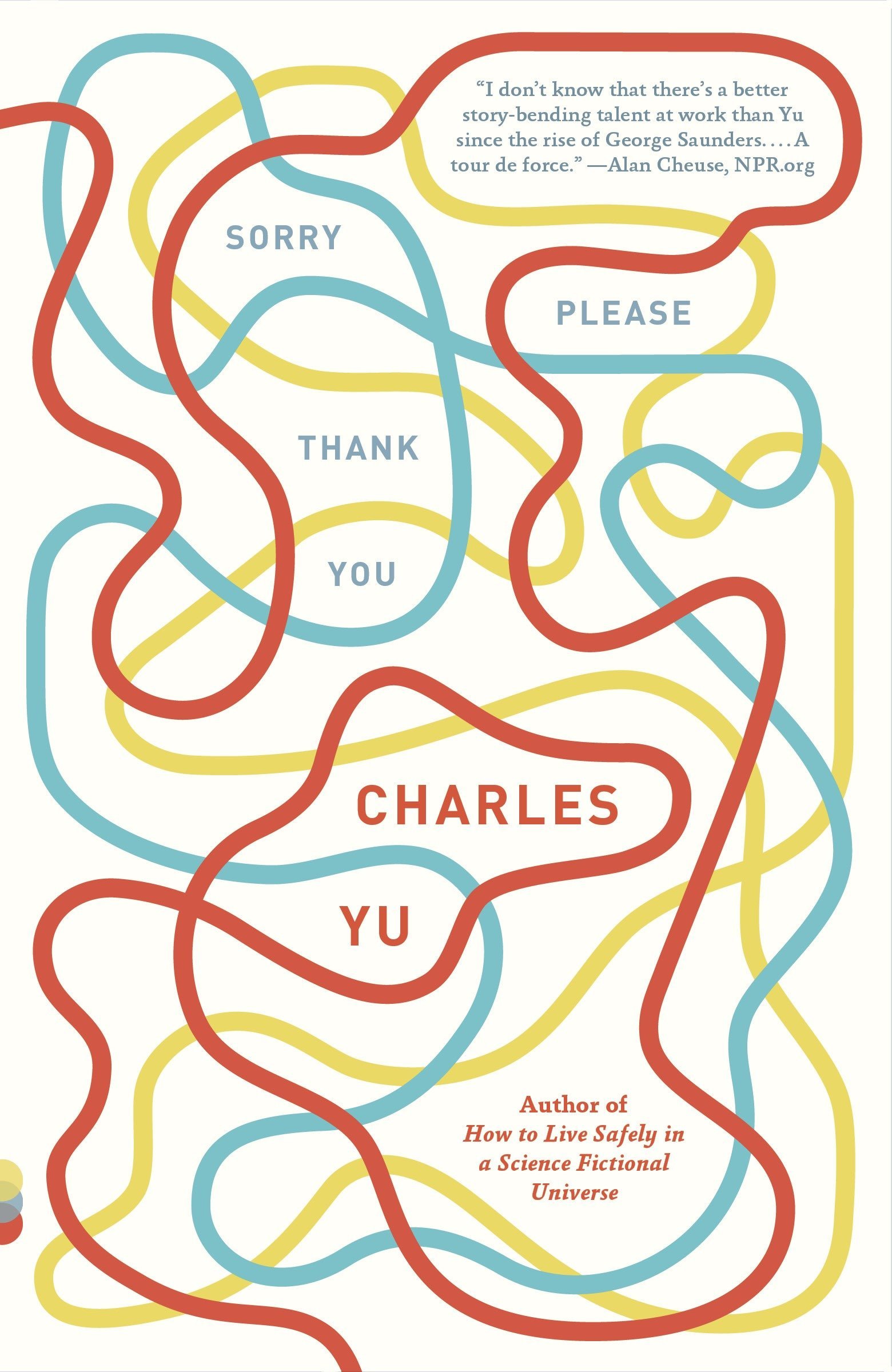We have barely sat down at Smooch Café in Fort Greene, and Jonas Hassen Khemiri, Swedish author and playwright, preempts my opening line: Should we do the interview in English?
The question seems inevitable coming from an author whose work has centered around language in one way or another since his debut novel One Eye Red took Swedish critics and readers by storm in 2003. A master of words who has created his very own language: Khemirish – a playful mix of Swedish, Arabic, French, English – has now been carefully translated by Rachel Willson-Broyles in Montecore, his first novel to be published in the US. So specific is his language that he doesn’t think his first novel can even be translated for the American market.
Now, however, we decide on English, despite our common nationality and the fact that Jonas Hassen Khemiri isn’t so fond of his English self. As he put it at a reading in Dumbo earlier this year: “I always feel a little bit like a nerd when I speak English.”
Nerd or not, since then he has received not only a write-up in the New York Times for Montecore, but also an Obie Award, the prestigious off-Broadway prize, this May for his play Invasion!, which had its U.S. debut in February. (It has also premiered in South Korea.) Directed by Erica Schmidt of The Play Company, Invasion! had an early fall revival in New York at The Flea Theater in Tribeca. We spoke in September, during this run of the play.
Interview
Katarina Matsson: Since your name is new to most Americans, let’s start from the beginning. Who is Jonas Hassen Khemiri?
Jonas Hassen Khemiri: I’m a 32-year-old granola-eating, theater-thinking Swedish writer who’s here because Invasion! re-opened at The Flea Theater – and to do some talks after the show, to sit in the audience and be very nervous, and to meet with people like you to do interviews. Then I’m going back home to Stockholm for the premiere of my new play, Apatiska för nybörjare (“Apathetics for beginners”).
It sounds like your attention is a bit divided?
It feels like my brain is in Sweden and my body is here. Hopefully I’ll make it through the day brainless! But I like to be reminded that there’s always this phase of nervousness before an opening. I remember when I had that with Invasion! – even though it was quite a long time ago.
Invasion!, your first play, premiered in Sweden in 2006. It deals with identity and the power of words. At the center is this elusive, almost magical name – Abulkasem – that takes on different meanings throughout the play. Is Abulkasem a playwright, a contradictory fundamentalist, a dorky guy in a bar, a hiding refugee – or all of the above? How do you think the piece has translated to English and specifically to an American context?
It’s difficult for me to say, because I’m not American enough to be the judge of that. According to the reactions of some of my American friends it seems like it has translated quite well, or very well, into an American context. We had some doubt whether or not to move [the play’s setting] from Sweden to the States. Now it’s set in the States. We felt that we had to do that in order to make the play immediate. This is a play that moves very fast. We did readings trying to keep it in Sweden, and it’s interesting because people had a much easier time to just laugh off the questions of fear and inequality that the play deals with, and not realize that it’s actually a play about their country also.
But when you won the Obie Award in May, the award committee said your play had “help[ed] us see ourselves, as Americans, more clearly.”
 That sounds very nice. I’m happy, because it is a play mainly about fear and about how identities, individual and collective, are being constructed through vague senses of threat. [It’s also] about language and how language is used to manipulate people. That is a subject that has kept coming back in my writing in different forms.
That sounds very nice. I’m happy, because it is a play mainly about fear and about how identities, individual and collective, are being constructed through vague senses of threat. [It’s also] about language and how language is used to manipulate people. That is a subject that has kept coming back in my writing in different forms.
Where and when did your interest in language start?
I think it comes from my background. Growing up in a multilingual family, and being around people who’ve been discriminated against because of their lack of language, you realize the power that a language gives you. I’ve always been in a luxurious position. My Swedish is perfect; I’ve always been able to choose between different levels of Swedish. I think that’s why these themes interest me.
What I’m doing now is quite different from what’s going on in Invasion! – or from anything I’ve done before. It’s difficult to talk about, because I don’t really know what it is. But in my new play, Apatiska för nybörjare, these themes of language and manipulation also play a big part. It begins with a national trauma in Sweden. I guess it’s even more related to the construction of a national identity. It’s actually a comedy about these apathetic refugee kids, a dark comedy. It deals a lot less with the kids than with how a national identity is constructed through the use of external elements.
One similarity between Invasion!, the new play, and a lot of things I’ve written is that they’re all trying to investigate the speed of words; how words can be transmitted very fast and how words can change meaning.
 There’s a recent example that I find very interesting. Qaddafi in Libya used to call his opponents “rats,” and Assad in Syria called them “germs.” When the rebels gained power there was a tweet from Syria saying: “We the germs of Syria, salute the rats of Libya.” That tweet got a huge spread in a matter of minutes. But I also thought it was interesting that “rats” and “germs” were the terms being used to de-humanize, because they’re also something that’s extremely difficult to stop. They can spread anywhere and they will definitely outlive us. That sense, that we live in a contemporary time where words are being spread and manipulated so quickly, is something that I find a lot of inspiration in.
There’s a recent example that I find very interesting. Qaddafi in Libya used to call his opponents “rats,” and Assad in Syria called them “germs.” When the rebels gained power there was a tweet from Syria saying: “We the germs of Syria, salute the rats of Libya.” That tweet got a huge spread in a matter of minutes. But I also thought it was interesting that “rats” and “germs” were the terms being used to de-humanize, because they’re also something that’s extremely difficult to stop. They can spread anywhere and they will definitely outlive us. That sense, that we live in a contemporary time where words are being spread and manipulated so quickly, is something that I find a lot of inspiration in.
Yes, linguistic change is a very big part of our society. Speaking of national trauma, the ten-year anniversary of 9/11 recently passed. The consequences of the attacks are apparent in Invasion!
Yes, in some ways. But I think that reading is more defined in the American version than in the French or German ones. I was never thinking explicitly of 9/11 when I wrote it. But that’s also what’s cool about writing theater, that my words can be amputated from me and put in a new setting. I’m not even in control of the actual translation, these are Rachel’s words, the translator’s, my words have been transmitted through her. And all of a sudden they start meaning something that I can’t pick up on. I’m very happy that people seem to like them, but I’m not sure I understand the reasons why people like them.
Sometimes the audience laughs at very peculiar places and I don’t understand what that means, especially politically. It wasn’t until I was here the first time that I realized it was literally performed in the shadow of the World Trade Center. And that added something to the play. The loss of that power I, as a playwright, have is actually something I really like. The feeling that “wow, I’m not in control of my words anymore, they can just mean anything,” that’s what the play is about. How a magical name is just being amputated and moved, almost like a relay baton.

These themes of language and names are also very present in Montecore, your second novel, published by Knopf in the US this spring. You constructed the story like an e-mail correspondence between a son and a man claiming to be his missing father’s best friend. Together they try to write the father’s life story, which becomes as much a clash between realities as between languages. The result is both humorous and heartbreaking.
That work is a lot more personal. It’s about the trials of writing the story of a missing father. And that story is quite, well, reminiscent of my life, to say the least. It’s a book that plays around a lot with the biographical facts of my life and then tries to show the fictionality – and the impossibility – of summarizing a life in a book.
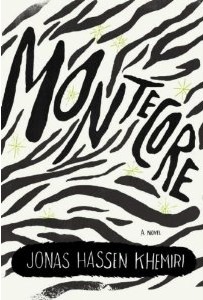 There are definitely links between Montecore and Invasion! because both projects end in a situation where the real, authentic person – be it Abulkasem in Invasion! or Kadir in Montecore – is very hard to capture. There’s something very fleeting and impossible in the ambition to capture a life. Another similarity between the two is that the emphasis [placed] on the way that people fantasize about the missing person actually tells the story. The fantasies that they use in order to conjure an image of this missing person tell the story of who they are. So we’re never in a position where we get to know their real selves, but through their fantasies we get the contours of who they are or who they would like to be.
There are definitely links between Montecore and Invasion! because both projects end in a situation where the real, authentic person – be it Abulkasem in Invasion! or Kadir in Montecore – is very hard to capture. There’s something very fleeting and impossible in the ambition to capture a life. Another similarity between the two is that the emphasis [placed] on the way that people fantasize about the missing person actually tells the story. The fantasies that they use in order to conjure an image of this missing person tell the story of who they are. So we’re never in a position where we get to know their real selves, but through their fantasies we get the contours of who they are or who they would like to be.
A lot of your work also centers on racism and a sense of in-between-ness. Growing up in Stockholm, with a Tunisian dad and a Swedish mom, did you feel any prejudice?
It’s one of those things that is difficult to talk about, because it easily becomes very victimizing. But I think that Sweden, despite a lot of Swedes’ feelings, is a country like all other countries. We have problems with discrimination and racism and homophobia and whatever. Growing up, it was much easier for me to try to put myself in an eternal underdog position. But things didn’t get interesting until I realized the [number] of situations where I was in a power position, where I was in fact in line with the power structure. Be it reading feminist thinkers, or my perfect Swedish, or growing up in Hornstull in Södermalm in Stockholm, an area that is typically middle class. The realization that I, in many settings, am enjoying privileges that I hadn’t seen before. I think my writing changed a lot when I realized that it wasn’t the underdog position that made me a writer; it was the interest in what these structures make of people.
 Then came questions on how to deal with that power, what to do with it. The feeling of being powerless is something a lot of my work centers on. How can we use language to manipulate ourselves out of a world where we feel powerless? I think that’s one of the red threads through all my work. The way a lot of my characters use language to block out the real world is very similar to what I’ve been doing my whole life. Words have been my comfort zone. But there’s also a kind of sadness to that. It has always been easier for me to write about life and politics for example, than to actually take part in a more practical way.
Then came questions on how to deal with that power, what to do with it. The feeling of being powerless is something a lot of my work centers on. How can we use language to manipulate ourselves out of a world where we feel powerless? I think that’s one of the red threads through all my work. The way a lot of my characters use language to block out the real world is very similar to what I’ve been doing my whole life. Words have been my comfort zone. But there’s also a kind of sadness to that. It has always been easier for me to write about life and politics for example, than to actually take part in a more practical way.
Yes, you’re very good at standing on the outside, looking in. But writing about life is also a way of taking part.
Yes, I’m hoping to show the complexities of life. I like a lot of writing that’s completely different from mine too, but this is my way of attacking things. I’ve never been very Brechtian, you know, it’s not my style to try to inspire class struggle or give an easy answer.
How did you find your language, your voice?
I’m not sure I have. I keep wanting to find new voices. I think that at one point it would be lovely to feel like I found a voice that felt like mine. But that’s based on the idea that I would have this authentic voice inside me, and I don’t believe that’s true. I think I consist of the sum of the multiple voices I’ve invented so far, and hopefully I will be able to invent more voices as I go along.
When you started writing Montecore, you heard the voice of Kadir, the missing father’s friend who employs a very special language, a mix of French and Arabic directly translated into Swedish (with a lot of laughs as a consequence!). Is that often how your writing project starts, with you hearing a voice?
Yeah, it’s quite audio-related. It feels like I hear voices. Which also sounds like I’m crazy. I remember when I was a kid and I heard writers say, “you have to listen to the voices.” I thought they were crazy and bullshitting me. But everything that I’ve written, that I’m remotely happy with, is something where the voices have taken over and made it work. With the new play, too, the voices took over. For me, the most enjoyable phase of writing has always been to just lean back and listen to what the voices are telling me.
With that in mind, it makes perfect sense that you’re a very good playwright and that you would find playwriting easier than writing a novel.
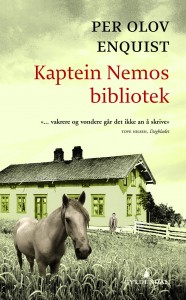 Definitely. I didn’t think about it until recently, but a lot of writers that I find inspiring are often writers who change back-and-forth between writing prose and plays. Cortázar for example and P.O. Enquist, they are both very voice-driven. One can argue that all writers are voice-driven, but I think that the writers that I really like are more concerned with trying to find rhythm or an internal order to a certain voice, rather than to transmit a certain story.
Definitely. I didn’t think about it until recently, but a lot of writers that I find inspiring are often writers who change back-and-forth between writing prose and plays. Cortázar for example and P.O. Enquist, they are both very voice-driven. One can argue that all writers are voice-driven, but I think that the writers that I really like are more concerned with trying to find rhythm or an internal order to a certain voice, rather than to transmit a certain story.
Someone asked me if a good memory is important to becoming a good writer. I think a lot of writers that I like tend to be more focused on having a good rhythm than on having a good memory. I’ve never been very impressed by writers who try to impress me with their good memory. You know what I mean?
You’ve told me before that you’re sort of face-blind. Do you think that has made you more audio-centered?
What I’ve heard is that a lot of people who have a really bad sense of faces are really good readers. I don’t know if I’m just saying this to comfort myself and if my source for this is Fox News or something … Maybe it’s just a feeling that if you’re bad with faces you need to read a lot of words for things to make sense. Or maybe it’s the fact that you read so many words that you become obnoxious and uninterested in people’s faces, haha. I don’t know what it means.
But I’ve always been very audio-focused. I dare you to one day meet me without these (he lifts the headphones that hang casually over his shoulders). You will never have seen me without my headphones since I was maybe 12. I literally don’t think I’ve stepped out of my apartment without them; I always, always have them.
Why?
Because I constantly feel the need to add something to boring, everyday life. It’s not enough to just walk down DeKalb Avenue and enjoy the sunshine. I need to have that perfect “enjoy the sunshine”-song to make it, you know, extra. It’s very internal. It’s my feeling of being in the very right position, of being where I’m supposed to be.
But it’s also a way of putting a filter, a distance, between yourself and the world.
Exactly. In a way it’s making the outside world count less. You can say that you add something to life by adding a soundtrack, but at the same time you’re also blocking a lot of things out. Maybe that’s what I’m kind of doing in writing. You have to block out certain things in order to be able to continue with this strange job.
I understand that your writing process is also very intense and solitary?
In periods, yes, but they’re also the phases I enjoy most in life. Every time I enter a phase where I know that “Wow, I’m going to be just writing the next couple of months,” that’s one of my happiest moments. I’m very happy now too, but I think those moments are the reason why I keep doing it. Like at the beginning of the summer when I realized that I had four months of just entering into my brain and trying different weird stuff out.
You also distance yourself geographically. You write a lot about Stockholm and Sweden, but you travel to all these big cities – Paris, Berlin, New York – to do it. How come?
I see myself as a very provincial writer. I’m not the kind of writer who has social, anthropological ambitions to go somewhere else. My memories and my background are extremely important for my writing. I think I was reminded of that when I came home from Berlin after spending two years there. I realized the amount of inspiration that I always get from memories. I used to have this strange idea that I could go anywhere and just make stuff up, but I don’t think I’m that kind of writer.

Further Links & Resources
- Visit Jonas Hassen Khemiri’s website – Khemiri.se – for more information on his plays, fiction, lectures, links to what inspired the work, and more.
- Interested in exploring Khemiri’s writing further, but your Swedish is a bit rusty? Consider picking up a copy of the English translation of Montecore from your local indie bookseller.
- Watch a short video about the original English debut of Invasion! at The Play Company in New York, here.
- Read the New York Times profile of Jonas Hassen Khemiri from September, which describes the Obie-winning play in these terms:
If Caryl Churchill, Franz Kafka and Ali G were to goof around one night and play their music too loud until the Department of Homeland Security came knocking on their door, they might emerge (eventually) the next morning holding something like the script to Invasion!

